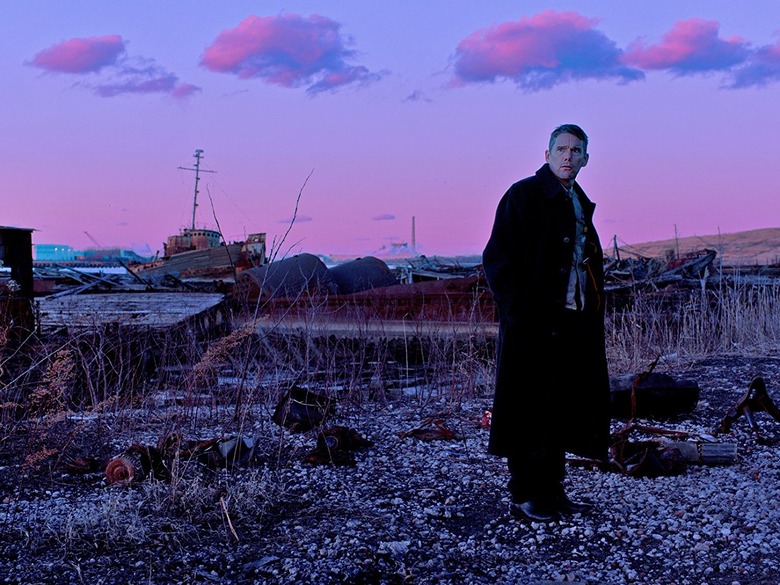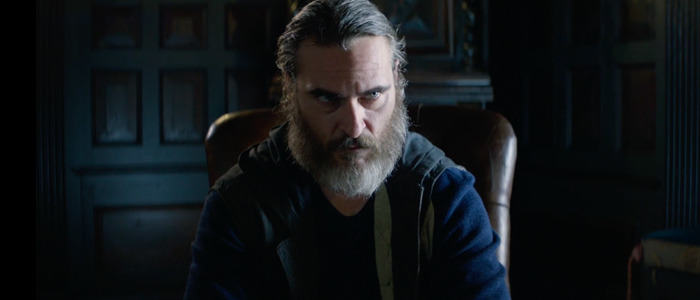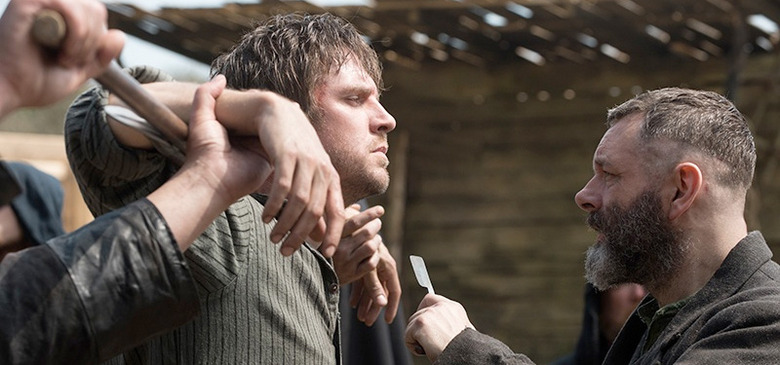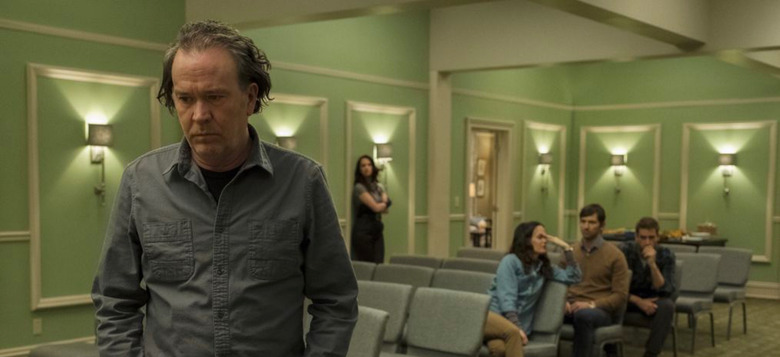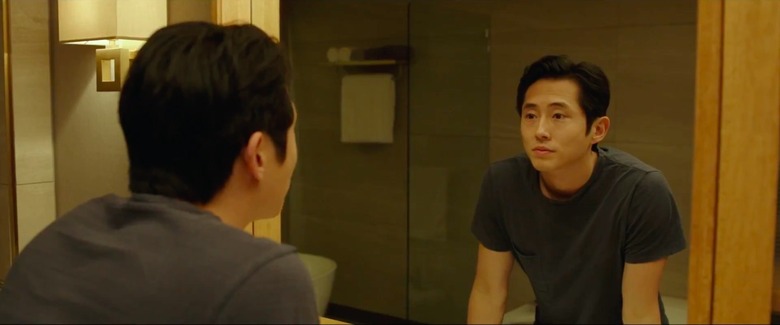I Am Not Gone: Finding Hope At The Movies In 2018
(This article discusses key plot points from Mandy, First Reformed, You Were Never Really Here, Apostle, Burning, and The Haunting of Hill House.)
One of the more indelible images contained in 2018's cinema arrives at about the halfway point of Panos Cosmatos' Mandy. Following an unspeakable misfortune, Red Miller (Nicolas Cage) stares down at all that remains of the titular woman he loves (Andrea Riseborough): a charred skull sitting atop a pile of fresh ashes. Without warning, the wind picks up and, as Jóhann Jóhannsson's haunting love theme throbs, we watch as Red's reason for being is quickly blown away before his eyes. Suddenly, the entire first half of the film – revolving around the couple's idyllic, secluded existence – feel like distant memories, lost to the ether of time and space and a fate that eludes anyone's control but the Gods who live between the planets above our heads.
For all the praise heaped upon Mandy for its "metal" and "insane" nature (and, don't get this writer wrong, Cosmatos' movie is insanely metal) what often gets lost in the conversation revolving around the instantly iconic genre picture is how crushingly melancholy it is. At its core, Mandy is a deeply heartrending movie, revolving around a man who literally loses the one light that keeps booze and violence at bay, succumbing to his basest nature as he descends into a literal pit to battle LSD-brained Cenobite bikers, gnarly cult weirdos, and their leader (Linus Roache, channeling Richard Lynch) who's basically the Faustian manifestation of fragile male ego. This is Alejandro Jodorowsky's Ghost Rider, only there's no returning from the abyss with a flaming skull; only the vague recollection of what it once meant to be truly happy with another human being.
Beyond its individual narrative, Mandy's central loss-laden through-line fits into a rather distinct thematic trend that's dominated some of 2018's finest films. The loss of hope for humanity – both the solitary and collective – has pervaded our entertainment to a rather upsetting degree, as many protagonists wrestle with notions of emptiness, their spiritual arcs revolving around re-discovering purpose on an ostensibly corroding planet. Yet it's not all doomcore gloom, as how these players reconcile this soulful dearth has led to moments of inspiring radiance in these dark rooms; eyes locked onto their images as our hearts yearn for any semblance of love and optimism to be reclaimed. Because without either, all truly is lost, just like Red Miller as he travels a winding road of bloody, coked out vengeance.
The Lost World
Paul Schrader's latest (and perhaps last) magnum opus, First Reformed, is the most obvious illustration of this fascination. The film revolves around Reverend Toller (Ethan Hawke), a preacher who becomes obsessed with the failing nature of Earth due to humans' abuse of its resources. Schrader transplants his usual fixations on isolated men, suffering from an existential disease that literally rots away in their stomachs. Like the troubled anti-heroes of Schrader's Taxi Driver and Light Sleeper, Toller keeps a hand-written journal of his daily thoughts and actions, relayed to us in often monotone voiceover as this Man of God wrestles with his own vanishing place on a planet being eroded by climate change.
Alone in the eponymous 250-year old Upstate New York place of worship, Toller hasn't so much lost his faith in God as he has in his ability to reach out to a younger generation prone to desperate extremism. When I spoke to Schrader about the movie, he elaborated regarding how the Reverend's POV is really a reflection of his own thoughts on the state of our universe:
"There is a futility in the air right now, and it's very thick. You are living in the first generation that no longer thinks the future will be better for your children. And you – as a person – have to ask yourself: 'how do I live with this? How do I carry on in the face of hopelessness?'
Toller isn't the only character in First Reformed posing these moral questions, as Mary (Amanda Seyfried) – a young pregnant Christian who fears that her husband Michael (Philip Ettinger) has experienced a similar death of sanguinity – questions whether bringing a baby into this world is anything but an act of cruelty. Toller tries to comfort the boy, but to no avail; discovering him dead from a self-inflicted shotgun wound in the park. Immediately after, Toller slips into his own anguished spiral, all while becoming fanatical about Michael's lost cause. Though they continue to visit one another, Mary's mere presence may not be enough to save the Reverend from the abyss, his newfound righteousness just as much a burden as his loss of religious purpose.
While watching both Mandy and First Reformed in quick succession, both the characters of Red Miller and Reverend Toller made this writer recall the final line of Schrader's initial description of Travis Bickle, the pistol-wielding anti-hero at the center his Taxi Driver screenplay:
"As the earth moves toward the sun, Travis Bickle moves toward violence."
Indeed, both Red and the Reverend are headed in similar directions, both mourning and crafting weapons for themselves in the form of battle axes and bombs. Yet only one will utilize these vicious tools as extensions of their existential crisis, while the other will be saved by the warmth of another.
If I Had a Hammer
While we're on the subject of Bickle, the 'Nam Vet turned low-rent chauffer once wished for a "real rain" to come and wash the "scum" from the streets of New York City. In You Were Never Really Here – Lynne Ramsay's splintered, harrowing tribute to transmuted trauma – one suspects the rain Travis spoke of has already arrived. Only instead of cleansing the sidewalks and alleys of vermin, it simply caused the cockroaches to scurry indoors, where high-priced brothels offer the flesh of underage concubines to Senators and businessmen harboring appetites for corruption all their own.
Now, it's up to a silent avenger named Joe (Joaquin Phoenix) to act as a sort of hammer-wielding Noah, pulling these girls from the Biblical tide and returning them to their homes (which may or may not shelter the folks who sold them off to these carnal proprietors in the first place). The grime-caked environments of this NYC are slightly cleaner thanks to gentrification, but certainly just as haunted by the degenerates Travis once so colorfully described. Danger still lurks around every corner of these neon-soaked American conurbations, threatening to relieve Joe of whatever target he's currently paid to rescue. Yet Phoenix's soldier of liberation trudges on, as he's become so damaged due to his time serving his country – overseas in the Marine Corps and wearing the blue windbreaker of an FBI agent – that these quests have become the only way he knows how to maintain any sense of spiritual integrity. In-between, he cares for his elderly mother (Judith Roberts), making sure she doesn't get too scared watching Psychoby herself while he's off doing his "job".
Beyond Joe's own loss of faith in his personal continuation (often coming to the brink of taking his own life just to feel something again), You Were Never Really Here is hopeless when it comes to institutions. Joe obviously abandoned confidence in being able to serve anyone while he was a soldier/officer of the law. Then the government itself conspires to snatch his latest vector – the daughter of a prominent politician (Ekaterina Samsonov) – from his grip, as local cops and even flag-wearing agents close in, serving the appetites of the empowered, privileged vermin Travis' rain revealed to be the true threat to American safety.
To call Ramsay's picture anti-establishment would be a vast understatement. It's often as paranoid as Alan J. Pakula's The Parallax View, or any of the other political thrillers from the '70s. Authority is only present to be perverted, and menace those truly invested in preserving any shred of innocence. In the end, how could anyone want to do anything but put a gun in their mouth in the middle a crowded diner, blowing their brains out only to have their demise ignored by the other patrons? These are the willfully blind, paying for their pancakes and going about their day, while Joe knows the real truth regarding what evils fester beneath the surface of all American cities, regardless of their post-Giuliani Disneyfication. There are heroes left here, only tortured servants teetering on the brink of oblivion.
Since You’ve Been Gone
Missing loves have also acted as motivators for a few of our cinematic leads in 2018, as Apostle's Thomas Richardson (Dan Stevens) is recruited to rescue his sister, Jennifer (Elen Rhys), who's been abducted by the followers of Prophet Malcolm (Michael Sheen). Together with his refugee "brothers" in prayer, Quinn (Mark Lewis Jones) and Charles (Richard Elfyn), who kneel before a "Goddess" they speak of with the highest reverence, the preacher's built a somewhat communist island paradise, where these burly, weathered men (along with the sons they father) put in a day's work for a day's bread. Material possessions from the mainland are outlawed, as no member is defined by what they own. All are equal, and the laws for living are outlined in Malcolm's self-penned Bible. Those uninterested in obeying are marked blasphemers and cleansed appropriately.
Thomas is a man whose faith was snatched away from him, thanks to conflicts he witnessed while attempting to spread the gospel overseas. A clever con man hooked on laudanum, Richardson lets this search become his own means for atonement, though it may not be in the Lord's eyes. Thomas is a former missionary who's seen and bears the scars of suffering his God not only demands, but seems to thrive on, and has no need for another wild-eyed preacher. They're all extolling the virtues of fascistic despair, keeping their flock in order under the threat of harm. Rescuing his sister from the clutches of another false purveyor of any Spirit's Word is no different in basic motivation than Joe yanking young prostitutes out of their places of forced business: the exploitation of purity stops here.
This central narrative conceit isn't simply relegated to English-language cinema, either, as South Korean auteur Lee Chang-Dong's Burning examines a hotbed of desire after poor delivery boy Lee Jong-su (Ah-in Yoo) encounters his childhood friend Shin Hae-mi (Jong-seo Jun), only to have her disappear shortly thereafter. A favorite at this year's Cannes Film Fest (where it received some of the most positive feedback in that prestigious event's history), what transpires is nothing short of the Korean Vertigo, as the hapless kid steadily grows more and more suspicious of the girl's rich playboy beau (Steven Yeun) who may have disposed of his latest "plaything". It's a work of masterful suspense, slowly building to a climax of upsetting violence.
Though Ah-in's isolated creative writing student is the movie's primary focus, Yuen's smarmy, smiling upper crust lothario is easily its most fascinating element. Casually cruel, this rich kid is everything our man isn't: charming, well off, blessed with good looks and friends in Gangnam, where he resides in a modern posh palace. Yet despite all he owns, Ben still seems dissatisfied with his life, telling Lee Jong-su that he sets greenhouses on fire every two months for fun; just so he can get the sense of what it feels like to "burn it all down in 10 minutes". He's "The Great Gatsby", transformed into a soulless predator, and his very existence seems to kill the poor boy's spirit, little by little, until he too is driven to an act of madness like his American counterparts.
A Family Affair
This loss of hope wasn't just found on the big screen, either, as Mike Flanagan's ten-part update on The Haunting of Hill House for Netflix is one of the year's very best pieces of filmmaking. Centered around the Crain Family, and alternating between their past as children in the ostensible spooked estate and their present as haunted adults, Flanagan's take on Hill House is about how the scars bestowed upon us by history help us build walls against human connection in the current day. All five of the Crain children – Stephen (Michael Huisman), Shirley (Elizabeth Reaser), Luke (Oliver Jackson-Cohen), Theo (Kate Siegel), and Nell (Victoria Pedretti) – cope with the spirits that still hang around them in various ways, while their father (Timothy Hutton) mourns the wife (Carla Gugino) he lost during the brief time they spent in what went on to become "America's Most Famous Haunted House".
Instead of losing faith in a deity, system of government, or themselves, The Haunting of Hill House instead zeroes in on a unit turning their backs on one another as they embark upon separate paths. Stephen publishes a book on their experiences with the house, thus isolating Shirley, who believes he's exploiting their childhood for "blood money". Shirley won't take a dime, even when her brother offers them all 8% of the hefty royalties, leading Theo and Shirley's husband Kevin (Anthony Ruiviva) to go behind her back to reap these financial rewards. Luke slides deeper and deeper into heroin addiction, skipping out on treatment centers while his siblings foot the bill, time and again. All the while, Nell has to discover comfort in sleep technician Arthur (Jordane Christie) on account of the waking paralysis she endures in the middle of the night. He's the only one who listens to Nell without resorting to calling her "crazy".
Like Mandy was for Red, Arthur becomes Nell's life raft during a time when it seemed like nobody else in this world could help her. Whenever she awoke in the middle of the night, it was his calming demeanor that brought her back from a place of total fear and anxiety, the "bent-neck lady" apparition that troubled her ever since she was a tea party-obsessed doll disappearing from her life completely. For anyone who's ever discovered that person in their life who can make any and all worries disappear, just by being by your side, the relationships between Nell/Arthur/Red/Mandy take on an entirely new meaning. You simply can't exist without that person, because they complete and strengthen you in ways you never thought possible before you luckily became entangled.
This is what renders Arthur's sudden death (from a brain aneurysm) and Nell's apparent suicide (upon journeying back to Hill House) all the more tragic. Almost everyone Nell calls from her family is either unavailable or unhelpful at her final hour, with her father answering just to hear his daughter's voice for one last time. Then she gets out of the car for one last dance with the husband she lost, accepting that her voice has been lost on everybody but him. In a ten-hour piece of cinema seemingly fueled by sadness, Nell's ultimate fate may be the most tragic of all, as if her family had possibly let each other in just a little while longer, she may have lived to see them continue to develop as people.
There Is No “Without”
The way that Red and Lee Jong-su react to their respective losses is like dominoes, falling because they must, and they know no other way. The "hero" of Mandy and the "hero" of Burning are both steadily moving forward, not content until they discover the answers behind the universe ripping their respective purposes away, and then punishing those responsible (whether they have enough proof to substantiate these acts of judgment or not). In Red's case, he literally burns down a temple and crushes the head of a self-proclaimed Messiah while screaming "I am your God now!", his acid-tinged voice a bellow of retribution against whatever forces conspired to bring him to this pit.
Joe and Thomas' individual journeys end on slightly more positive notes, but still leave room for unsettling ambiguity to creep in through the periphery. You Were Never Really Here's central avenger has seemingly bested his enemies and sits with the Senator's daughter in a diner, only to imagine taking his own life. Of course, this fantasy gives way to reality, where he follows the girl out of the eatery, into a sunny oblivion where the ghosts of his work will still undoubtedly haunt him. Meanwhile, Thomas succeeds in retrieving his sister, yet leaves a similar path of death and destruction in his wake while searching for her. His final moments see the former missionary becoming one with the island and its otherworldly pagan presence, wrapping him in vines and grass, unifying the human with his environment. In fairness, we could read this as an acceptance of sorts, as this new universe recognizes a spirit that seems to be operating with an intention of general goodness, as opposed to setting up an arena of dominance on its premises. Nevertheless, both Joe and Thomas may have rescued others, but have still sacrificed almost all of themselves in the process.
The final moments we spend with Reverend Toller are quite different, as he plans an act of terror at his church that will claim the lives of men he views as responsible for the planet's death. Wrapped in barbed wire like some sort of modern martyr, he gives up the plan, only to pour himself a glass of drain cleaner instead, recognizing that an act of destruction solves nothing, but he can exit an existence he no longer deems acceptable. Before he's able to down the Drain-o, Mary confronts him, and the two embrace, Schrader's camera swirling around the new lovers as they let go of their despair together. It's a triumphant image that refutes a great deal of Schrader's distinctive oeuvre, primarily stemming from the cynical, destructive ethos laid out by the semi-autobiographical Bickle. In short: love wins, where more loss could've been an easy alternative.
The same could be said for the conclusion of Hill House, which sees the Crain children all gathered in the mysterious Red Room (which they hadn't knowingly been able to open for the entirety of their lives). Luke's attempted suicide to join his twin sister Nell in the beyond, only to be revived by her ghost, who imparts possibly the greatest wisdom any piece of pop entertainment from 2018 has to offer:
"Everything's been out of order...time, I mean. I thought for so long that time was like a line; that our moments were laid out like dominoes, and they fell, one into another, tipping one into the next, and then the next, in a long line between the beginning and the end. But it's not like that at all. These moments fall around us like rain, or snow, or confetti..."
Luke tells his sister that he cannot go on without her, but Nell simply responds that there is no "without". She is not gone, but rather "sprinkled onto [his] life like new snow." It's an incredibly comforting notion, and an inadvertent answer to the rest of the year's fictional indications that the only real reaction to loss is action. Instead, The Haunting of Hill House asks viewers for stillness; a consideration that while the moments they've enjoyed with the people they love the most may be over, they still live on for as long as they're able to remember and feel them all around. While certainly not a new idea, the way this philosophy is cathartically packaged as the answer to this ghostly riddle is utterly perfect.
2018 has been a difficult year for a myriad of reasons, so it's easy to understand why some of our very best art is so undeniably angry, extolling the cathartic virtue of Old Testament retribution. Yet works like First Reformed and The Haunting of Hill House provide a rather satisfying counterbalance to these pulpy scales of justice. Even when we feel like everything around us is crumbling, and that we've possibly done wrong ourselves, hurting and ignoring the needs of our friends and neighbors, there's hope to be discovered in the loving arms of forgiveness, which Nell goes on to describe as "warm, like a tear on a cheek." Though absolution may not be as cinematic as revenge, mercy can still be twice as powerful; a poignant reminder that human beings are imperfect creatures, and will err many times during their non-linear lives. All we can hope is to gain understanding that bad times will come, and bad times will go, and how we react to those sporadic moments of pain defines who we are as individuals.
"The rest," as the ghost says, "is confetti."

